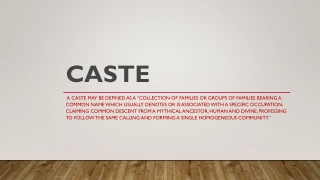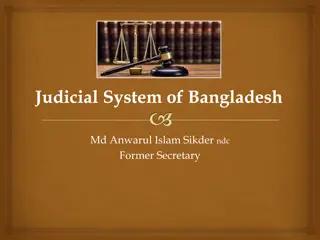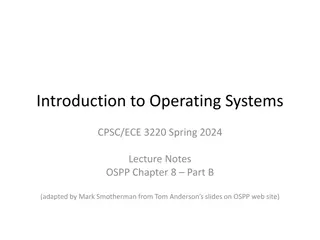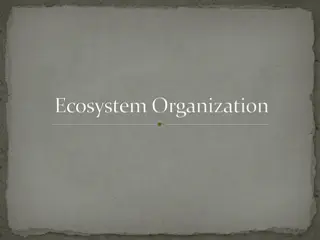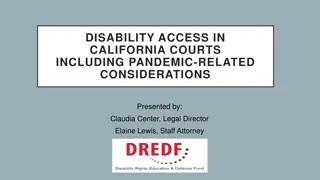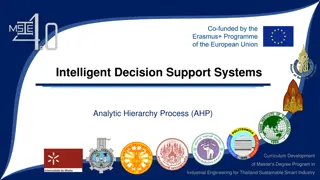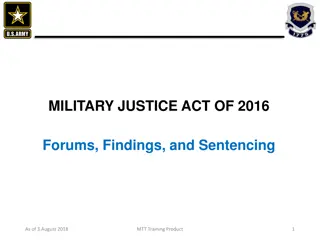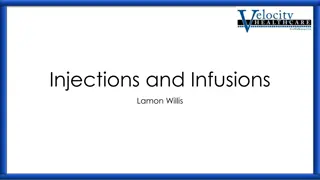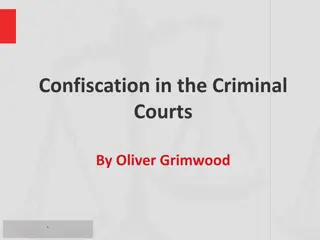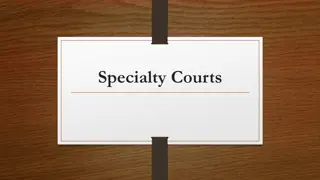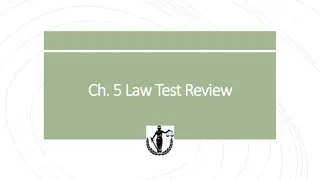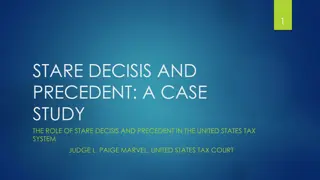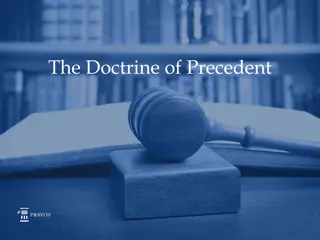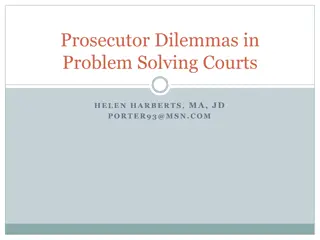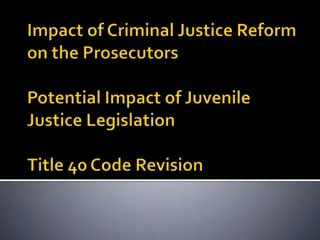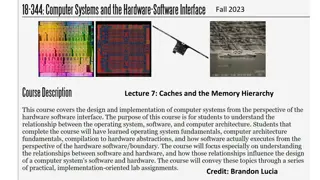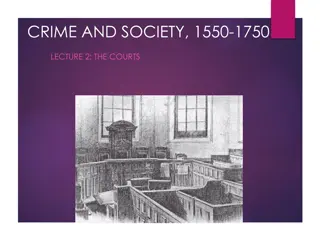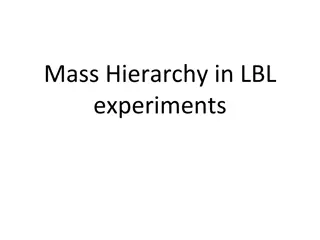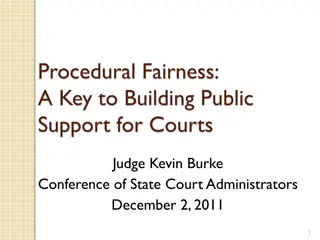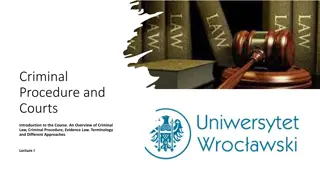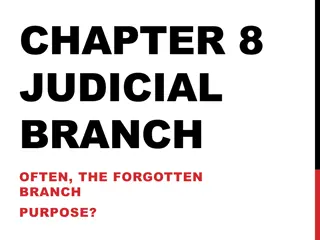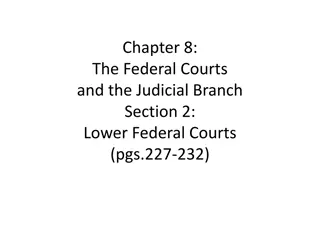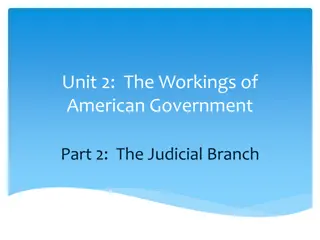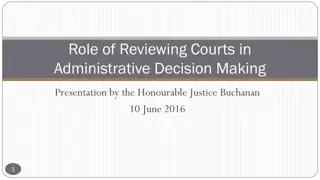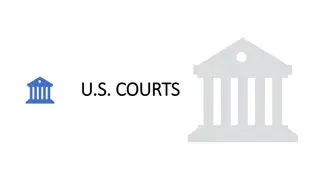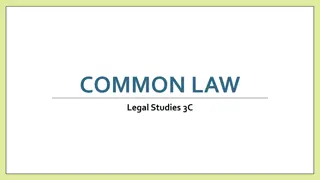Overview of Caste System in India
The caste system in India is a social structure defined by hereditary groups, each with specific occupations, rules, and traditions. Membership is based on birth, leading to a rigid hierarchy and limited mobility between castes. Endogamy, occupation, commensality, and purity are key features that sh
0 views • 17 slides
Understanding the Judicial System of Bangladesh
The judicial system of Bangladesh is diverse, consisting of the Supreme Court, civil and criminal courts, courts of special jurisdiction, and more. The Constitution plays a vital role, outlining the structure and functions of the courts. From the Supreme Court to subordinate courts and tribunals, th
1 views • 37 slides
JUDICIAL REVIEW OF NATIONAL ACTION BY UNCLOS COURTS AND TRIBUNALS
International judicial review involves oversight by international courts and tribunals over the actions of States Parties in implementing their international commitments. UNCLOS courts exercise supervisory jurisdiction through grounds of review like due regard, reasonableness, necessity, and proport
1 views • 7 slides
Introduction to Operating Systems
Explore the concepts of address translation, Translation Lookaside Buffer (TLB), TLB usage in modern processors, TLB invalidate mechanisms, and hardware design principles related to memory hierarchy using examples from the Intel i7 processor. Understanding the trade-offs and costs associated with TL
0 views • 30 slides
Understanding the Role of Town and Village Courts in Municipal Governance
Explore the historical significance and impact of Town and Village Courts on municipal boards, focusing on the balance between branches of government, the importance of Justice Courts to constituents, and tips for enhancing relationships between municipalities and justice courts.
0 views • 46 slides
Understanding Maslow's Hierarchy of Needs in Humanistic Psychology
Humanistic psychologists, such as Abraham Maslow and Carl Rogers, viewed personality as a quest for self-determination and self-realization. Maslow's hierarchy of needs illustrates how individuals progress from fulfilling basic physiological needs to achieving self-actualization and self-transcenden
0 views • 25 slides
Understanding Ecosystem Organization and Hierarchy
Explore the intricate relationships within ecosystems through the study of organization and hierarchy. From individual organisms to complex communities, learn how biotic and abiotic factors shape these environments. Gain insights into the levels of ecosystem organization, from single organisms to in
5 views • 15 slides
Disability Access in California Courts: Pandemic Considerations and Legal History
This presentation on disability access in California courts, including pandemic-related considerations, covers relevant laws like Title II of the ADA and Section 504, historical developments such as the ADA enactment, and rules ensuring non-discrimination and accessibility in court proceedings. It a
0 views • 30 slides
Analytic Hierarchy Process (AHP) for Sustainable Smart Industry Curriculum Development
Intelligent Decision Support Systems and the Analytic Hierarchy Process (AHP) play a crucial role in the development of a Master's Degree Program in Industrial Engineering for Thailand's Sustainable Smart Industry. AHP, developed by Thomas Saaty, aids in measuring intangible factors through paired c
0 views • 23 slides
Understanding Hierarchy Change Processes in Tatmeen
Discover the hierarchy change processes within Tatmeen's distribution system involving packaging, serialization, and association of products at different levels. Learn about the modes of hierarchy change - Pack, Unpack, and Unpack All - and how they impact the distribution process to ensure efficien
0 views • 68 slides
Aristotle's Justification of Hierarchy and Republican Aspects of Citizenship
Aristotle's concept of citizenship involves a hierarchical structure where ruling and being ruled in turn is essential. He justifies this hierarchy by emphasizing the advantageous nature of ruling and being ruled. However, his views on citizenship in Greek city-states were limited to adult males, hi
3 views • 6 slides
Ensuring Quality in Legal Translation by 3 Parties: Governments, Courts, and Translators
Explore the importance of quality legal translation involving governments, courts, and translators in criminal proceedings. The European Union's Directive on interpretation and translation aims to facilitate communication across Member States. Governments play a key role in regulating the translatio
0 views • 20 slides
Overview of Military Justice Act of 2016 and Court-Martial Proceedings
This comprehensive overview covers the Military Justice Act of 2016 and various aspects of court-martial proceedings, including different types of courts-martial, required votes for findings and sentencing, changes in special court-martial procedures, and more. The content delves into the specific c
0 views • 44 slides
Understanding Injections and Infusions in Healthcare
Determining the hierarchy of injections and infusions is crucial in medical coding and billing. Infusions are prioritized over pushes, which are prioritized over injections. This hierarchy should be followed for accurate reporting and coding. IV Infusion Therapy involves administering fluids or medi
0 views • 57 slides
Understanding Chomsky Hierarchy in Language Theory
Explore Chomsky Hierarchy in language theory, including different types of languages, grammars, and automata. Learn how to prove if a language is regular, context-free, recursive, or recursively enumerable. Understand the closure properties of regular, context-free, recursive, and recursively enumer
2 views • 10 slides
Confiscation in the Criminal Courts: A Guide to Proceeds of Crime Law
Confiscation in the criminal courts involves depriving defendants of benefits gained from criminal conduct within their means. The Proceeds of Crime Law in the Cayman Islands sets guidelines for these proceedings, emphasizing that confiscation is not a form of punishment but aims to recover obtained
3 views • 17 slides
Overview of Grammar Types and Chomsky Hierarchy
The four types of grammars are General, Context-Sensitive, Context-Free, and Linear grammars, each recognizing a specific set of languages. Chomsky Hierarchy categorizes these grammars into four levels, indicating subsets of languages they can recognize. Context-free grammars have specific productio
0 views • 17 slides
Redesigning the GPU Memory Hierarchy for Multi-Application Concurrency
This presentation delves into the innovative reimagining of GPU memory hierarchy to accommodate multiple applications concurrently. It explores the challenges of GPU sharing with address translation, high-latency page walks, and inefficient caching, offering insights into a translation-aware memory
1 views • 15 slides
Cultural Awareness for Drug Courts Working with Native American Participants
Understanding the cultural nuances of Native American communities is crucial for Drug Courts collaborating with Tribal Healing to Wellness Courts. This involves acknowledging tribal sovereignty, regional and cultural differences, customs, spirituality, and communication styles unique to American Ind
0 views • 22 slides
Specialty Courts and Recidivism Rates in the United States
Specialty Courts, such as Drug Courts and Problem-Solving Courts, provide intensive behavioral supervision and treatment for substance abuse and mental health issues. These courts aim to reduce recidivism rates and engage criminal offenders in therapeutic interventions. Nevada is actively running 42
1 views • 14 slides
Understanding Jurisdiction and Court Systems: Law Test Review
Explore the concept of jurisdiction in the legal system, from the powers of courts to the different types of courts like admiralty and appellate courts. Learn about the structure of the federal courts in the U.S. and the functions of the Supreme Court. Gain insights into the specialized jurisdiction
2 views • 41 slides
The Role of Stare Decisis and Precedent in the U.S. Tax System
The United States tax system relies on the principles of stare decisis and precedent to ensure consistency and fairness. The Constitution grants Congress the power to levy taxes with specific limitations. Federal courts play a crucial role in interpreting tax laws and resolving disputes, with a stru
1 views • 17 slides
Understanding the Judicial Branch of the Federal Government
The Judicial Branch, as the third branch of the federal government, ensures fair law enforcement and interprets laws through criminal and civil cases. Federal courts were established to address issues of state-based justice disparities. The judiciary system comprises district courts for trials, circ
1 views • 34 slides
Understanding the Doctrine of Precedent in the UK Legal System
The doctrine of precedent, also known as stare decisis, is a fundamental principle in the UK legal system that requires courts to follow previous decisions on similar facts. This system ensures consistency and predictability in the application of law. The hierarchy of courts dictates the binding nat
0 views • 21 slides
Challenges and Innovations in Problem-Solving Courts
Helen Harberts, a skilled MA and JD with expertise in problem-solving courts, delves into the dilemmas faced by prosecutors in these courts. Through in-depth insights and thought-provoking questions, the narrative explores the effectiveness of traditional responses to addiction-based offenses, publi
0 views • 65 slides
Impact of Criminal Justice Reforms on State Courts and Prosecutors
Changes in crime classifications and sentencing laws, along with the emphasis on Accountability Courts, are reshaping the criminal justice landscape in the state. Key changes include alterations to theft, burglary, and controlled substance laws, impacting the workload of state courts and prosecutors
0 views • 20 slides
Understanding Caches and the Memory Hierarchy in Computer Systems
Delve into the intricacies of memory hierarchy and caches in computer systems, exploring concepts like cache organization, implementation choices, hardware optimizations, and software-managed caches. Discover the significance of memory distance from the CPU, the impact on hardware/software interface
0 views • 84 slides
Virtual Town Hall Monroe County Problem-Solving Courts: Stories and Statistics
Explore the Virtual Town Hall hosted by Viterbo University VOICE Initiative and Monroe County, focusing on Problem-Solving Courts. Learn about the initiatives, perspectives, and impacts of Drug Treatment Court, OWI Treatment Court, and Family Reunification Court. Gain insights from key figures like
0 views • 23 slides
Crime and Society, 1550-1750: Courts and Legal System Overview
The lecture covers the courts and legal system during the period of 1550-1750, focusing on the role of the monarch, Parliament, King's Bench, Court of Common Pleas, Assizes, Old Bailey, and local courts like Quarter Sessions. It highlights the hierarchy and functions of different courts in dealing w
0 views • 19 slides
Insights into Mass Hierarchy Determination in Long-Baseline Neutrino Experiments
Combining appearance probabilities of electron and anti-electron neutrinos in long-baseline experiments can help determine the mass hierarchy, with ongoing experiments collecting significant data by 2020. Analyses point to CP violation possibilities, with updates expected in Neutrino2016. The capabi
0 views • 6 slides
Understanding Public Perceptions of Courts and Judges
Exploring public opinions on procedural fairness in courts, this content discusses the influence of judges' political views, aspirations for higher courts on their impartiality, and the divided nation on interpreting the Constitution. It also highlights the complexities of public knowledge about the
0 views • 24 slides
Introduction to Criminal Procedure and Courts: Overview and Terminology
This piece provides an introduction to a course on Criminal Procedure and Courts, covering topics such as criminal law, evidence, courts, and international legal bodies. It outlines the exam format, information on lecturers, and essential knowledge needed for the course. Additionally, it shares insi
0 views • 28 slides
Understanding the Judicial Branch of the United States
The Judicial Branch, often overlooked, plays a crucial role in interpreting and applying laws fairly. It was established under Article 3 of the Constitution with the dual system separating state and federal courts. The Judiciary Act of 1789 proposed a three-tiered court system, including District Co
0 views • 31 slides
Understanding the Federal Court System in the United States
The Federal Court system in the United States comprises District Courts, handling a vast number of cases each year, with each district having multiple judges. These courts have jurisdiction over a range of cases, including civil rights violations, employment disputes, criminal offenses, and bankrupt
0 views • 11 slides
Role of Supreme Courts in Ensuring Effective Judicial Systems in the European Union
This communication focuses on the vital role of Supreme Courts in guaranteeing the effectiveness of judicial systems within the European Union. It delves into the significance of courts' communication strategies, emphasizing accessibility of justice, trust-building, and public image. The discussion
0 views • 29 slides
Overview of Courts and Legal System in Greece
The legal system in Greece is structured around ordinary and special courts, with judicial power vested in the courts of law. The system includes ordinary civil, criminal, and administrative courts, along with special courts for specific cases. The three jurisdictions - civil, criminal, and administ
0 views • 22 slides
The American Judicial Branch: Structure and Judicial Review
The American judicial system consists of District Courts, Appellate Courts, and the Supreme Court. District Courts handle initial cases, Appellate Courts hear appeals, and the Supreme Court is the highest authority. Justices are nominated by the President and confirmed by the Senate. Judicial review
0 views • 12 slides
Role of Reviewing Courts in Administrative Decision Making Presentation
The presentation by the Honourable Justice Buchanan on the role of reviewing courts in administrative decision-making highlights key legal cases and principles. It explores the delicate balance between judicial review and administrative decision-makers' discretion, emphasizing the importance of proc
1 views • 38 slides
Understanding the U.S. Court System: Jurisprudence and Structure
Law enforcement officers play a crucial role in the criminal justice system by understanding criminal jurisprudence and the court system's structure. This includes knowledge of different court levels, jurisdiction, and the adjudication process. The duality of courts, such as adult vs. juvenile court
0 views • 43 slides
Overview of Legal System in Australia
This content covers various aspects of the legal system in Australia, including common law, sources of law, court hierarchy, appeals process, federal courts, and the importance of judicial independence. It outlines the key components of the legal framework, such as the role of Parliament, judge-made
0 views • 36 slides
